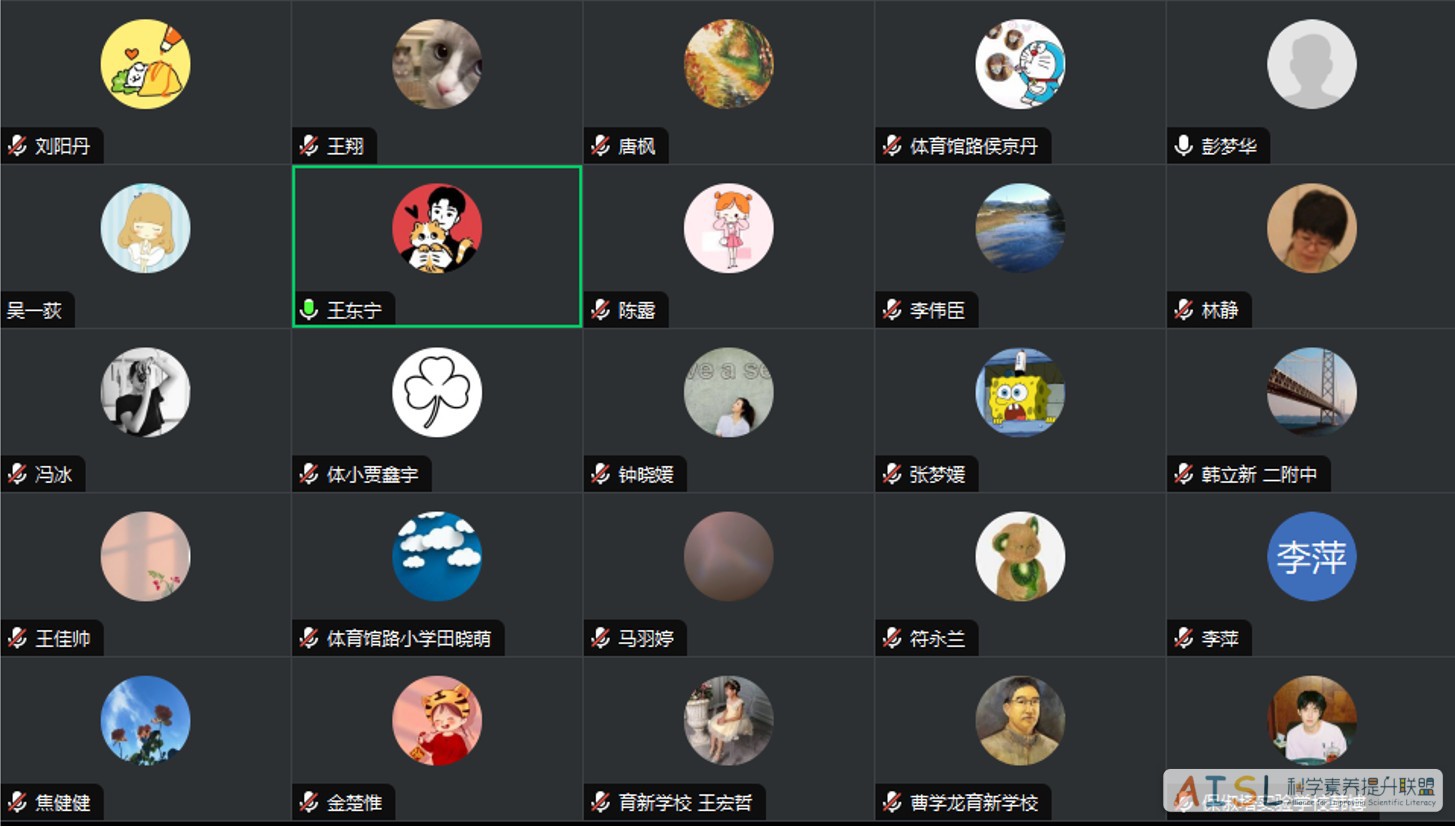2024年3月6日19:00-21:00,SSI-L项目组在腾讯会议室举行了在线研讨活动,主要围绕合作校北京市东城区体育馆路小学新学期的SSI-L议题选题展开探讨。会议由SSI-L项目学科指导专家组组长、北京师范大学第二附属中学物理学科特级教师彭梦华主持,SSI-L项目负责人、科学家、学科指导专家等出席会议并进行指导,四所合作校的教师团队在线参与。
北京市东城区体育馆路小学侯京丹老师代表学校项目团队介绍了关于人工智能议题学习的初步设想,包括文本编辑、AI换脸、声音克隆等方面的技术应用现状和随之而来的争议点,并介绍了认识人工智能、分析人工智能和回归议题的内容设想。彭梦华老师基于这一选题构想,引导与会者思考学生如何理解人工智能处理问题的能力,以及如何面对人工智能带来的社会性问题。
北京师范大学第二附属中学物理学科组组长韩立新老师强调了学生关注人工智能议题的重要性,并以科幻作品中的伦理问题为例,如无人驾驶的列车问题,探讨了人工智能的伦理挑战。他还提出了机器人与人工智能的区别,以及如何在教育中引导学生理解这些差异。中国科学院国家天文台郑永春研究员从科技的角度出发,分享了他对人工智能、机器人和大数据关系的看法,并强调了教育中应如何引导学生理解和应对这些技术。他提出应该引导学生梳理人工智能的发展历史和关键事件,就如何让学生通过实践活动体验人工智能给出建议。
首都师范大学附属育新学校课程中心唐枫主任讨论了社会性科学议题的来源,包括课本、学生困惑和社会热点,并探讨了人工智能作为热点的适宜性。北京市密云区教师研修学院小学科学特级教师李伟臣老师提出如何设计适合小学生的人工智能相关活动,强调了活动应具有操作性和趣味性,提出了让学生体验人工智能产品,以及通过调查问卷了解人工智能在不同领域的应用。人民教育出版社化学室副主任钟晓媛老师建议在讨论人工智能时,可以聚焦于具体应用,如自动驾驶,并探讨相关的道德困境。各校教师曹学龙、李萍、陈露、王东宁、符永兰、韩博等老师也积极发言,提出了各自的观点和建议,形成了丰富的讨论氛围。
SSI-L项目负责人、中国基础教育质量监测协同创新中心科学提升部主任林静老师对会议进行总结,强调了议题选择在考虑议题的社会性、科学性、伦理性与开放性的同时,还是从教学的角度,考虑是否适宜学生学习。林老师指出,人工智能确实是当下的一个热门话题。引发学生关注并体验人工智能,这是非常好的;但要让小学生围绕人工智能开展SSI-L,则要慎重考虑。可以研读小学各学科课程标准,看看能否从中挖掘到可支撑小学生探讨人工智能的学科知识与能力,了解小学生对人工智能的常识与判断能力如何。林老师强调SSI-L的选题与活动设计应基于学生的认知水平,避免过于抽象,确保学生能够通过实际体验和探究活动,能够形成自己的见解和理解。
通过本次交流,各合作校教师与学科指导专家共同探索了SSI-L议题选择和顶层设计中的问题,为合作校新学期的SSI-L课程设计打开了思路。

From 19:00 to 21:00 on March 6, 2024, the SSI-L project team held a webinar discussion via Tencent Meeting. The discussion focused on SSI-L issue selection for the new semester at a partner school, Tiyuguan Road Elementary School in Dongcheng District, Beijing. It was chaired by Peng Menghua, head of the disciplinary guidance expert team of the SSI-L Project and a special-rank physics teacher of the Second High School Attached to BNU. The SSI-L project leader, scientists, and disciplinary guidance experts attended the meeting and offered instructions. Teachers from four partner schools also participated into the discussion from online.
On behalf of the school project team, Hou Jingdan, from Tiyuguan Road Elementary School in Dongcheng District, Beijing, introduced their preliminary ideas around artificial intelligence of SSI-L, including the status of technological applications of text editing, AI face-changing, voice cloning, etc., and the subsequent controversies. She also introduced the content design, which includes understanding AI, analyzing AI, and a return to the existing issues. Based on this design, Peng Menghua led participants to think about the ways in which students understand AI’s capability in problem-solving, and how they deal with the social issues brought by AI.
Han Lixin, leader of the physics subject group at the Second High School Attached to BNU, emphasized the significance of students’ interest in the AI issue. He took ethical concerns in science fictions as examples to discuss the ethical challenges of AI, for instance, the issue of driverless trains. He also mentioned the differences between robots and artificial intelligence, and how to instruct students to understand these differences through education. Zheng Yongchun, a researcher from the National Astronomical Observatory of the Chinese Academy of Sciences, shared his views on the relationship between artificial intelligence, robots, and big data from the perspective of science and technology. He stressed the ways in which science education instruct students to understand and cope with these technologies. He proposed that students should be guided to sort out the development history and key events of artificial intelligence. He also gave suggestions on how to allow students to experience AI through practice activities.
Tang Feng, director of the curriculum center of Yuxin School Attached to Capital Normal University, discussed the sources of AI issues, including textbooks, students’ confusion and social hotspots. He then talked about the appropriateness of artificial intelligence as a hotspot issue. Li Weichen, a special-rank science teacher at Miyun District Teacher Training College Primary School in Beijing, put forward ideas about how to design AI-related activities that are suitable for primary school students. He emphasized that these activities should be operational and entertaining, and then proposed that students should be encouraged to experience AI products, and learn about the application of AI in different fields through questionnaires. Zhong Xiaoyuan, deputy director of the Chemical Education Department of People’s Education Press, suggested that when discussing artificial intelligence, teachers could focus on specific applications, such as autonomous driving, and explore relevant moral dilemmas. Cao Xuelong, Li Ping, Chen Lu, Wang Dongning, Fu Yonglan, Han Bo, and other teachers from each partner school spoke up actively and expressed their own views and suggestions, creating a good discussion atmosphere.
Lin Jing, leader of the SSI-L project and director of the Science Development Department of the Collaborative Innovation Center of Assessment for Basic Education Quality, made concluding remarks of the discussion. She emphasized that issue selection of SSI-L should consider not only the social, scientific, ethical, and open nature of the topic, but also whether it is suitable for students to learn from the teaching perspective. Lin pointed out that artificial intelligence is indeed a hot topic at present. It is very good to arouse students’ interest and encourage them to experience AI. But it still needs careful consideration when it comes to carrying out SSI-L around artificial intelligence for primary school students. Teachers could study the curriculum standards across various primary school subjects, to see if they can excavate relevant disciplinary knowledge and abilities that support primary school students in AI discussion, and to learn about primary school students’ general knowledge and skills to make judgments of AI. Lin stressed that the issue selection and activity design of SSI-L should be based on students’ cognitive level, avoid being too abstract, and ensure that students can develop their own opinions and understanding through real-world experience and inquiry activities.
Through this exchange, teachers from each partner school and disciplinary guidance experts jointly discussed problems in SSI-L issue selection and top-level design, which opened up new ways of thinking for the new semester SSI-L curriculum design of partner schools.
